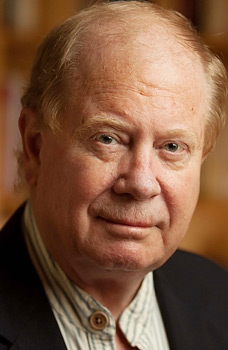Author Biography | Interview | Books by this Author | Read-Alikes

Joseph J. Ellis is one of the nation's leading scholars of American history. The author of nine books, Ellis was awarded the Pulitzer Prize for Founding Brothers: the Revolutionary Generation and won the National Book Award for American Sphinx, a biography of Thomas Jefferson. His in-depth chronicle of the life of our first President, His Excellency: George Washington, was a New York Times bestseller.
Ellis' newest book, The Quartet: Orchestrating the Second American Revolution, 1783-1789, was released in Spring 2015.
Ellis has taught in the Leadership Studies program at Williams College. He previously taught at the Honors College at the University of Massachusetts, Mount Holyoke College, and the United States Military Academy at West Point. He lives in Amherst, MA with his wife, Ellen Wilkins Ellis and three dogs. He is the father of three sons.
Joseph J. Ellis's website
This bio was last updated on 09/25/2016. In a perfect world, we would like to keep all of BookBrowse's biographies up to date, but with many thousands of lives to keep track of it's simply impossible to do. So, if the date of this bio is not recent, you may wish to do an internet search for a more current source, such as the author's website or social media presence. If you are the author or publisher and would like us to update this biography, send the complete text and we will replace the old with the new.
What made you decide to follow your award winning biography of Thomas
Jefferson with Founding Brothers and what kind of research went into this
book?
After I finished my last two books, on John Adams and Thomas Jefferson, I
realized that I had read much of the correspondence produced by the founding
generation. I did have to go through the Washington letters, and read the Burr
correspondence, but otherwise I had pretty much started a new book on the entire
group of founders without quite knowing what I was doing. And throughout those
letters, they kept referring to each other as a "band of brothers." We
think of them as Founding Fathers, but they saw themselves as a fraternity. I
should add that my title fails to include the one sister in the group, Abigail
Adams, whom I think was an equal partner in her husband's political career.
You open the book with the sentence, "No event in American history
which was so improbable at the time has seemed so inevitable in retrospect as
the American Revolution." How so?
We regard the success of the American Revolution as inevitable because we
have lived so long as a nation, over two hundred years, with the consequences of
its success. Looking back over that stretch of ...
Education is the period during which you are being instructed by somebody you do not know, about something you do ...
Click Here to find out who said this, as well as discovering other famous literary quotes!
Your guide toexceptional books
BookBrowse seeks out and recommends the best in contemporary fiction and nonfiction—books that not only engage and entertain but also deepen our understanding of ourselves and the world around us.